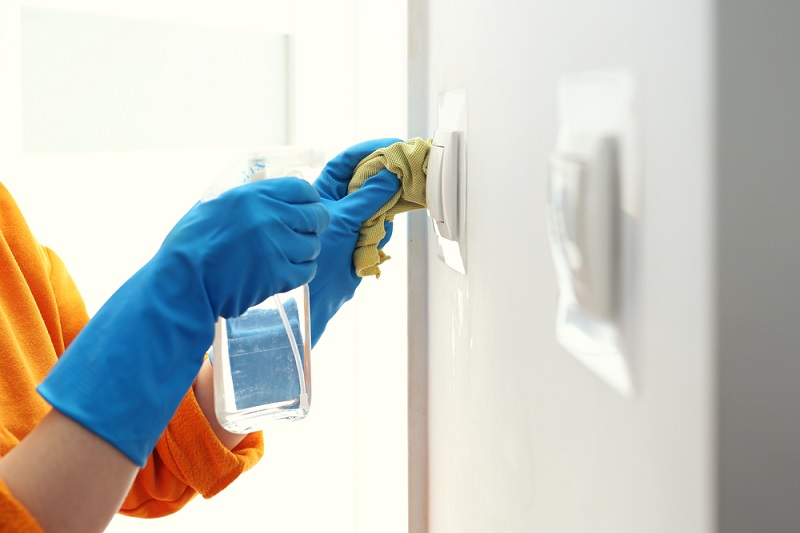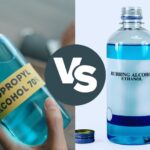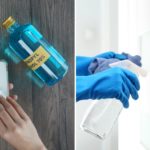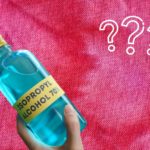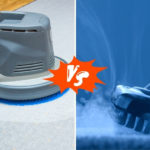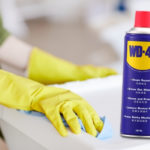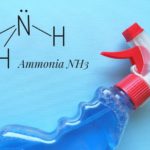Rubbing alcohol is a popular cleaning solution that can be used to clean various surfaces around a home. It’s relatively cheap to get hold of, super easy to use and dries incredibly fast, so it’s the ideal item to have in your cleaning bag.
So, where do you buy rubbing alcohol from in the UK? Keep on reading to find out.
Where to Buy Rubbing Alcohol for Cleaning in the UK
It just so happens that there are a wealth of brands selling rubbing alcohol online, and you can pick a bottle or two up in pharmacies and shops up and down the country.
Just make sure you buy rubbing alcohol that contains an alcohol level of 70% plus.
Online
1. Eternal Beauty Rubbing Alcohol
Eternal Beauty’s competitively priced rubbing alcohol is made in the UK, contains 70% isopropyl alcohol and comes in a 250ml bottle.
It can be used to clean a variety of surfaces in a home, from removing ink stains to taking out gooey residue marks.
It’s an excellent item to have at home ready for when you need to carry out small cleaning jobs.
2. Ican London Isopropyl Rubbing Alcohol
If you’re looking to buy some rubbing alcohol for very small jobs, say a one-off project, Ican London Isopropyl Rubbing Alcohol is ideal for you.
You can pick up a 50ml bottle from Amazon, and it can be used to clean keyboards, to remove stains and to take out sticky residues from surfaces.
And although the bottle size is small, and you will only have a limited number of uses from a single bottle, it does mean that there’ll be less waste.
For example, if you bought a bigger bottle, you may only use a few drops of the rubbing alcohol before discarding the product and forgetting about it.
There’s less chance of this happening if you purchase a small bottle like this, because you’re more likely to use the entire bottle in one go.
3. Trade Chem Rubbing Alcohol
A bottle of Trade Chem’s Rubbing Alcohol contains 70% isopropyl alcohol, and can be used for medicinal purposes, as a general surface cleaner and as a disinfectant.
The 500ml bottle can get rid of bacteria with ease and because of its concentration, you don’t need to use a huge amount of the product in one go. You can also pick up a 5-litre bottle of the product and you’d get a lot more use out of this.
4. British Basics All Purpose Rubbing Alcohol
If you’re after an all-round strong alcohol-based product, look no further than British Basics’ Rubbing Alcohol.
Boasting an isopropyl alcohol level of 99.9% this multipurpose product will make short work of getting rid of grease and oils, glue residue and ink stains from surfaces.
In addition to the screw cap 500ml bottle, you can also pick up a nozzled bottle too. The squirty nozzle can make spot cleaning easier, plus there’s less risk of you tipping, spilling and overusing the solution too.
- See price and reviews on Amazon.co.uk (screw cap)
- See price and reviews on Amazon.co.uk (squirt bottle)
5. Hexeal Rubbing Alcohol
Hexeal Rubbing Alcohol is manufactured in the UK, is 99.9% isopropyl alcohol, and it can be used as a multipurpose cleaner, degreaser and sanitiser.
The solution is very simple to use and you don’t need to use lashing of the liquid to see significant results.
In shops and supermarkets
In general, it’s easier to come by rubbing alcohol online. However, you can pick up a bottle of rubbing alcohol in pharmacies and shops like Boots and Superdrug, but they’ll be selling the product under the name ‘surgical spirit’ instead of ‘rubbing alcohol’.
You’ll likely have to ask a member of staff for advice as the shop may not have a large stock of this item, and the location of the product may vary from one store to another.
Rubbing alcohol usually isn’t available for sale in supermarkets, unless they have a dedicated pharmacy counter. If they have a pharmacy, they will probably sell rubbing alcohol under the name ‘surgical spirit’.
Rubbing Alcohol Uses
Below you’ll find some examples of when and where you can use rubbing alcohol. The list of uses is, of course, endless but here are some ideas to get you started:
1. Disinfecting surfaces
Spray the solution over the surface you wish to disinfect and wipe the area down with a clean cloth.
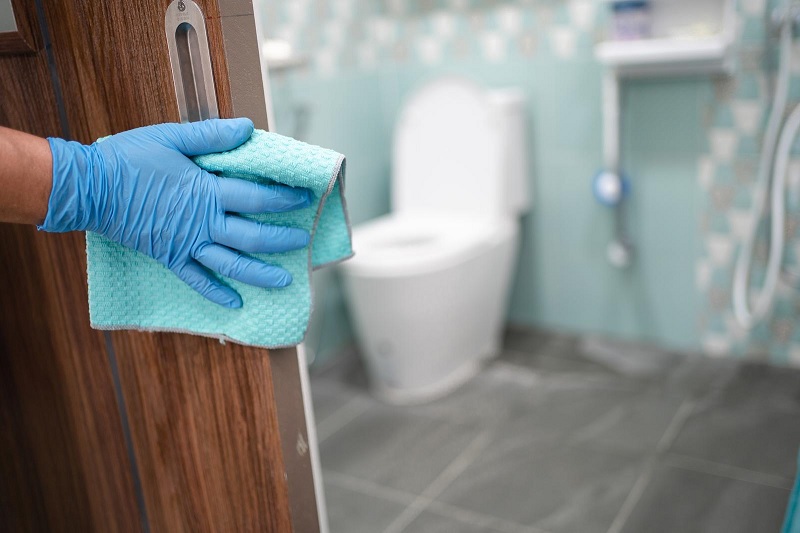
2. Deodorising shoes
Fill a spray bottle with a dash of rubbing alcohol and water, spray the inside of the shoes and leave them to dry outside in the sunlight. (Do a patch test first).
3. Sanitising cloths and sponges
Leave the sponge or cloth to soak in a rubbing alcohol solution for a few hours, then rinse the item down before using it again.
4. Cleaning electronic devices
Dab a cotton bud into some rubbing alcohol and gently and carefully clean the dirty surface. The fact that rubbing alcohol dries incredibly quickly is what makes it good at cleaning electronics.
As you can imagine, you can’t really soak phones and keyboards in water, so this is the ideal cleaner!
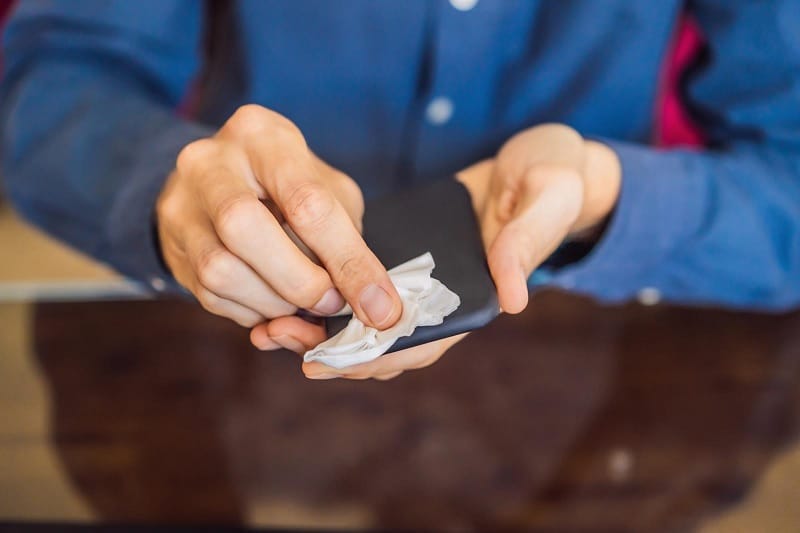
5. Cleaning tiles and mirrors
Simply create a sprayable solution, squirt the area you want to clean with a rubbing alcohol solution, then use a clean cloth to wipe the surface down.
6. Degreasing surfaces in the home
Dab at the set-in greasy spots with some rubbing alcohol, and then clean the entire area with a spray version of the rubbing alcohol to remove excess dirt and to sanitise the surface.
Tip: Rubbing alcohol should always be tested on a discreet patch of surface before it is used to clean an entire area. The chemical cannot be used to clean all areas and tools, so perform a patch test before you ruin items in your home.
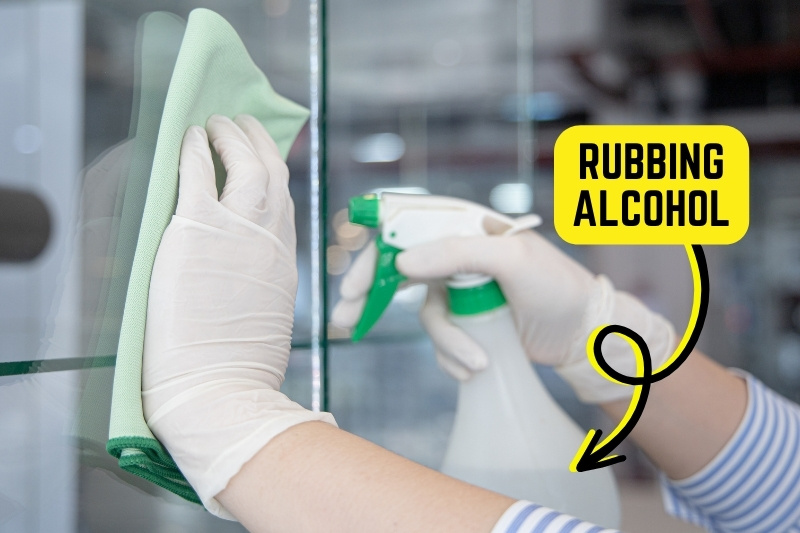
Rubbing Alcohol FAQs
What is rubbing alcohol?
Rubbing alcohol is a denatured alcohol liquid that is made up from isopropyl alcohol or ethanol, bitterants and water. It has become a household name over the years because it’s great at breaking down greases and oils!
Today, rubbing alcohol is used for cleaning, degreasing and disinfecting various surfaces around the home.
Rubbing alcohol is colourless, dries incredibly quickly and is extremely smelly! It is also very poisonous and should not be consumed.
Is rubbing alcohol the same as isopropyl alcohol?
Rubbing alcohol and isopropyl alcohol are not the same thing.
Rubbing alcohol contains isopropyl alcohol, water and other ingredients, and it’s usually much weaker than isopropyl alcohol.
Isopropyl alcohol, on the other hand, is pure alcohol and is extremely strong.
Both do, however, have disinfecting properties, can be poisonous, are colourless, are flammable and smell funny.
What is rubbing alcohol called in the UK?
‘Rubbing alcohol’ is the American name given for this type of cleaning alcohol. In the UK, however, people often refer to this product as ‘isopropyl alcohol’, ‘surgical spirit’ or ‘rubbing IPA’.
Technically rubbing alcohol and isopropyl alcohol are not the same thing, but people confuse the two products and use the terms interchangeably.
Rubbing alcohol contains isopropyl alcohol and a few other ingredients, whereas isopropyl alcohol stands alone and is a highly concentrated alcohol. The fact that rubbing alcohol contains other ingredients, like water, makes it weaker than isopropyl alcohol.
Is rubbing alcohol the same as drinking alcohol?
Rubbing alcohol is different to the alcohol you find in beers, wines and spirits. Rubbing alcohol, therefore, is not safe to consume.
Alcohol that is safe to drink is ethanol-based and has usually gone through some kind of fermentation and distillation processes, so the alcohol concentration is much lower.
Whereas rubbing alcohol is usually isopropyl-based, contains chemical bitterants and is poisonous.
Rubbing alcohol’s alcohol content is also much, much higher than what you would find in drinkable spirits, and it’s this high alcohol rate that makes the product toxic and dangerous to consume.
Is rubbing alcohol the same as hand sanitiser?
Rubbing alcohol and hand sanitiser are not strictly the same thing, although they do share similar characteristics.
First, hand sanitisers contain a high level of alcohol and a thickening ingredient, like carbomers or aloe vera gel. It’s this thickening agent that gives the product its gel-like consistency and makes it different to standalone watery rubbing alcohol.
If the hand sanitiser didn’t contain the additional thickening ingredient, the sanitiser would be like any other liquid and it would run off your hands. This, in turn, would mean that you’d either have to sanitise your hands extremely quickly, or you wouldn’t clean your hands effectively.
So, in this case the thickening agent, that gives the sanitiser its thick texture, provides you with more time to clean your hands properly.
Secondly, hand sanitisers contain moisturisers that make sure that the liquid doesn’t dry your skin out as fast. Using rubbing alcohol alone would dry your hands out very quickly, and washing your hands with such a liquid isn’t recommended anyway.
Finally, although both products are different, they are both good at removing bacteria and disinfecting surfaces because they contain a high alcohol count.

Bethan has a passion for exploring, reading, cooking and gardening! When she’s not creating culinary delights for her family, she’s concocting potions to keep her house clean!
